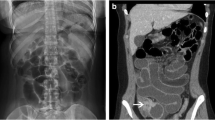Abstract
Background: Palliative surgical intervention for malignant duodenal obstruction is often associated with a significant morbidity. Endoscopic enteral stenting offers a suitable alternative, that is safe, effective, and less invasive. This study reports our experience with the use of self-expanding metal stents in the palliation of malignant gastric duodenal obstruction. Methods: A retrospective review of all patients who underwent duodenal stenting from November 1998 to February 2001 was performed. All the patients had symptomatic gastric outlet and duodenal obstruction with nausea, vomiting, and decreased oral intake. All of them underwent enteral stenting with self-expandable metal Wallstents 20 or 22 mm in diameter and 6 or 9 cm long. Results: For this study, 33 patients (19 men and 14 women) with a mean age of 62 years (range, 37–81 years) were identified, 32 of whom had successful duodenal stent placement (6 were performed as outpatient surgery). The malignancies were pancreatic 18 (54%), gastric 4 (12%), duodenal 3 (9%), metastatic 6 (18%), and cholangiocarcinoma 2 (6%) disorders. The site of obstruction was pyloric (n = 5; 15%), pyloroduodenal (n = 3; 9%), duodenal bulb (n = 11; 33%), second portion of duodenum (n = 9; 27%), second and third portion of duodenum (n = 3; 9%), C-loop (n = 1; 3%), and anastomotic (n = 1; 3%). A total of 29 patients (91%) had good clinical outcomes, with relief of obstructive symptoms, Two of three patients with no symptomatic relief underwent gastrojejunostomy. One patient refused further treatment. No immediate stent-related complications were noted. During the follow-up period, 20 patients died (none as a result stent-related causes) due to progression of cancer. Median survival was 102 days. Four patients had recurrent obstruction (2 tumor ingrowths, 1 overgrowth, and 1 distally migrated stent) at a mean interval of 82 days. All four had successful restenting without complications. Conclusion: Self-expandable metal stents placed endoscopically provide a safe, less invasive palliative treatment option with good clinical outcome in the management of malignant gastric outlet–duodenal obstruction.
Similar content being viewed by others
Author information
Authors and Affiliations
Rights and permissions
About this article
Cite this article
Kaw, M., Singh, S., Gagneja, H. et al. Role of self-expandable metal stents in the palliation of malignant duodenal obstruction. Surg Endosc 17, 646–650 (2003). https://doi.org/10.1007/s00464-002-8527-1
Received:
Accepted:
Published:
Issue Date:
DOI: https://doi.org/10.1007/s00464-002-8527-1




